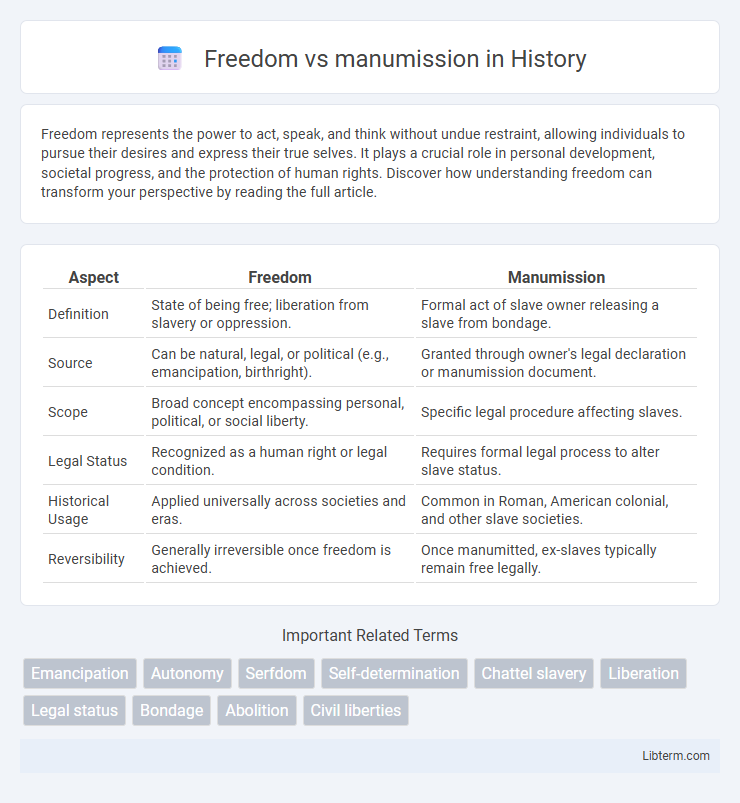Freedom represents the power to act, speak, and think without undue restraint, allowing individuals to pursue their desires and express their true selves. It plays a crucial role in personal development, societal progress, and the protection of human rights. Discover how understanding freedom can transform your perspective by reading the full article.
Table of Comparison
| Aspect | Freedom | Manumission |
|---|---|---|
| Definition | State of being free; liberation from slavery or oppression. | Formal act of slave owner releasing a slave from bondage. |
| Source | Can be natural, legal, or political (e.g., emancipation, birthright). | Granted through owner's legal declaration or manumission document. |
| Scope | Broad concept encompassing personal, political, or social liberty. | Specific legal procedure affecting slaves. |
| Legal Status | Recognized as a human right or legal condition. | Requires formal legal process to alter slave status. |
| Historical Usage | Applied universally across societies and eras. | Common in Roman, American colonial, and other slave societies. |
| Reversibility | Generally irreversible once freedom is achieved. | Once manumitted, ex-slaves typically remain free legally. |
Defining Freedom and Manumission
Freedom represents the state of being free from slavery, oppression, or confinement, embodying inherent human rights and autonomy. Manumission specifically refers to the formal legal act through which a slave owner grants freedom to an enslaved individual, often documented through legal contracts or decrees. While freedom emphasizes the condition of liberty itself, manumission highlights the process and legal mechanism by which that liberty is conferred.
Historical Contexts of Manumission
Manumission refers to the legal process by which a slave is formally freed by their owner, a practice prevalent in ancient Rome, Greece, and American slavery contexts. Historical manumission often occurred through petitions, wills, or special decrees, reflecting evolving social, economic, and legal dynamics in societies reliant on slavery. The distinction between freedom and manumission lies in manumission's formal, owner-driven act, marking a transition within historical frameworks from bondage to legal autonomy.
Legal Differences Between Freedom and Manumission
Freedom is the state of being free from slavery or servitude, whereas manumission is the legal process by which an enslaved person is formally freed by their owner. Manumission involves specific legal documentation or court approval, establishing the former enslaved individual's status as free under the law. While freedom is the condition, manumission is the formal act that legally transitions someone from slavery to freedom.
Social Implications of Both Concepts
Freedom denotes the inherent human right to live autonomously without oppression, fostering equal social participation and empowerment across diverse communities. Manumission, the formal act of a slave owner granting freedom to an enslaved individual, historically altered social hierarchies by introducing formerly enslaved people into free society while often maintaining existing racial and economic disparities. Both concepts profoundly influence social dynamics, with freedom underpinning universal human rights and manumission representing a transitional, juridical mechanism with complex social ramifications.
Psychological Impact on the Formerly Enslaved
Freedom and manumission represent distinct legal statuses that profoundly influence the psychological well-being of the formerly enslaved. The uncertainty and conditional nature of manumission often generate heightened anxiety and a sense of precariousness, undermining feelings of security and self-worth. In contrast, absolute freedom fosters empowerment and identity reconstruction, facilitating psychological healing and long-term resilience.
Freedom as a Universal Human Right
Freedom as a universal human right encompasses the inherent entitlement of every individual to live without oppression, coercion, or arbitrary restriction. Manumission specifically refers to the legal act of freeing a slave, highlighting a historical context where freedom was granted rather than inherent. Emphasizing freedom as an inalienable human right transcends historical practices of manumission by affirming equality and dignity for all individuals from birth.
Manumission: Conditional or Partial Liberation
Manumission refers to the conditional or partial liberation of enslaved individuals, often granting freedom with specific restrictions or obligations attached. This form of emancipation may require continued service, payment, or adherence to legal conditions, distinguishing it from unconditional freedom. Historical records indicate that manumission served as a transitional step in various societies, balancing social control with gradual liberation.
Case Studies: Ancient Societies and Manumission
Manumission in ancient societies such as Rome and Greece often reflected complex legal and social frameworks where freed individuals gained limited rights and obligations, differing significantly from modern concepts of absolute freedom. Case studies reveal that Roman manumission granted freedmen partial citizenship and economic opportunities while retaining certain patronal dependencies, contrasting with Greek practices where freedom was more tightly linked to civic participation. These historical examples illustrate the nuanced transition from slavery to freedom, highlighting variations in social integration, legal status, and economic roles across different ancient cultures.
Freedom, Citizenship, and Social Integration
Freedom represents the fundamental human right to live without oppression, encompassing civil liberties crucial for social integration and active citizenship. Citizenship confers legal recognition, enabling individuals to exercise rights and responsibilities that facilitate full participation in societal institutions and community life. Social integration depends on the recognition of both freedom and citizenship, fostering inclusive environments where former slaves and marginalized groups can access equal opportunities and social mobility.
The Legacy of Manumission in Modern Society
Manumission, the historical act of a slave owner freeing enslaved individuals, established early legal precedents for personal liberty that influence modern human rights frameworks. The legacy of manumission endures in contemporary society by reinforcing the value of autonomy and legal emancipation, shaping laws against involuntary servitude and promoting social justice. These foundations contribute to ongoing efforts for equality and the protection of individual freedoms worldwide.
Freedom Infographic

 libterm.com
libterm.com